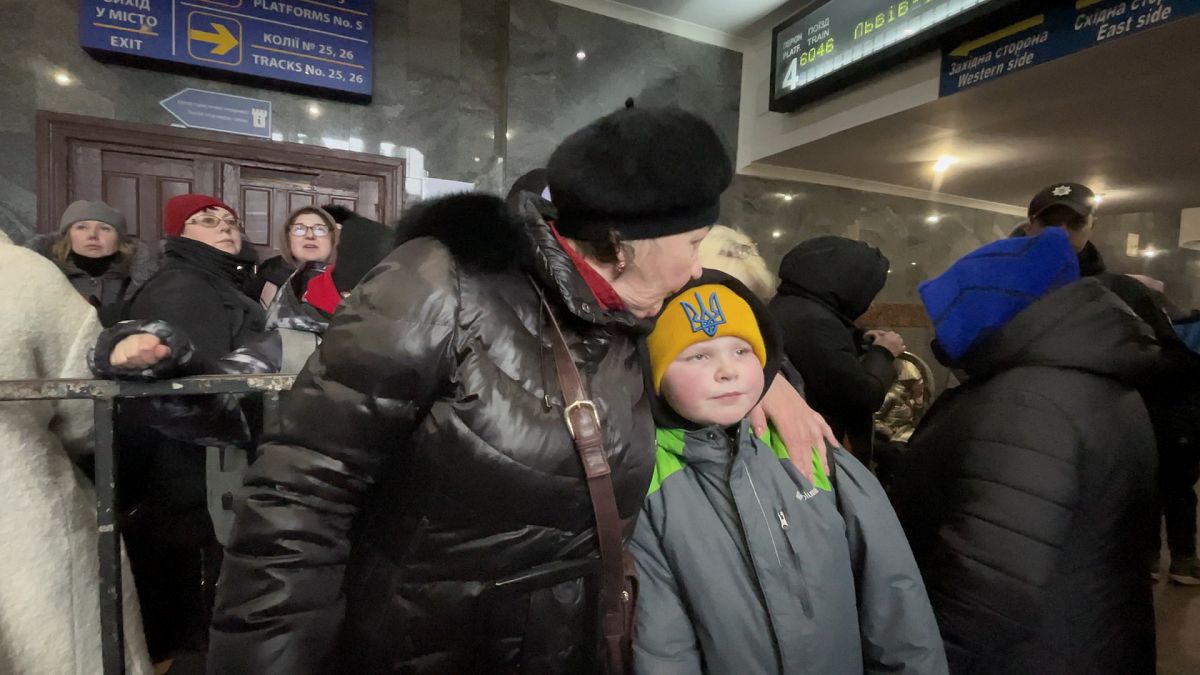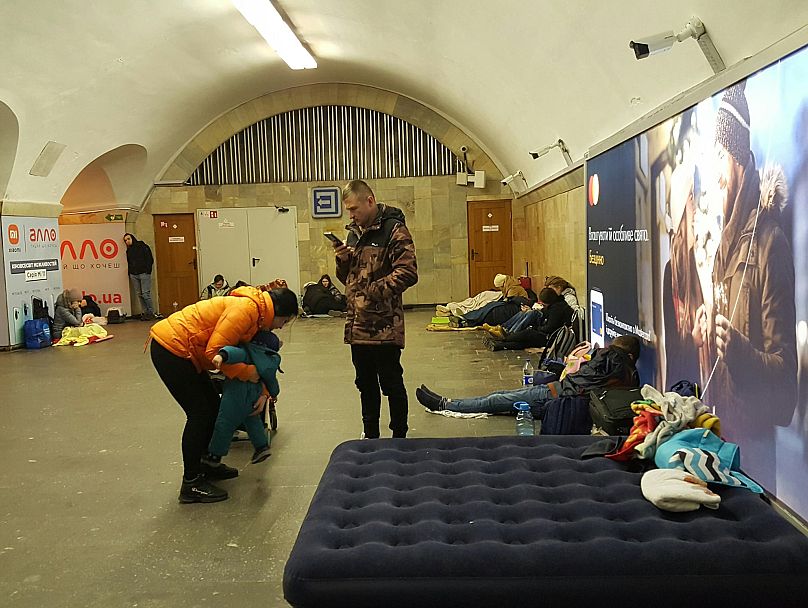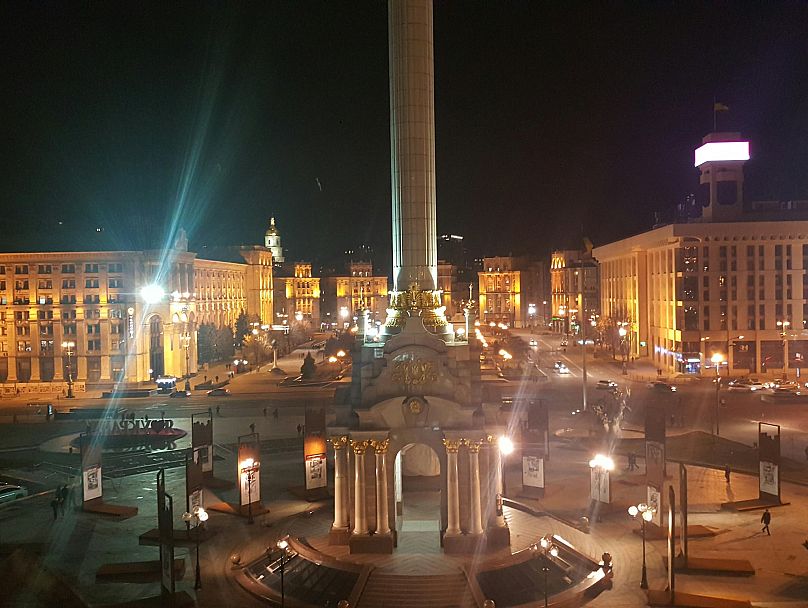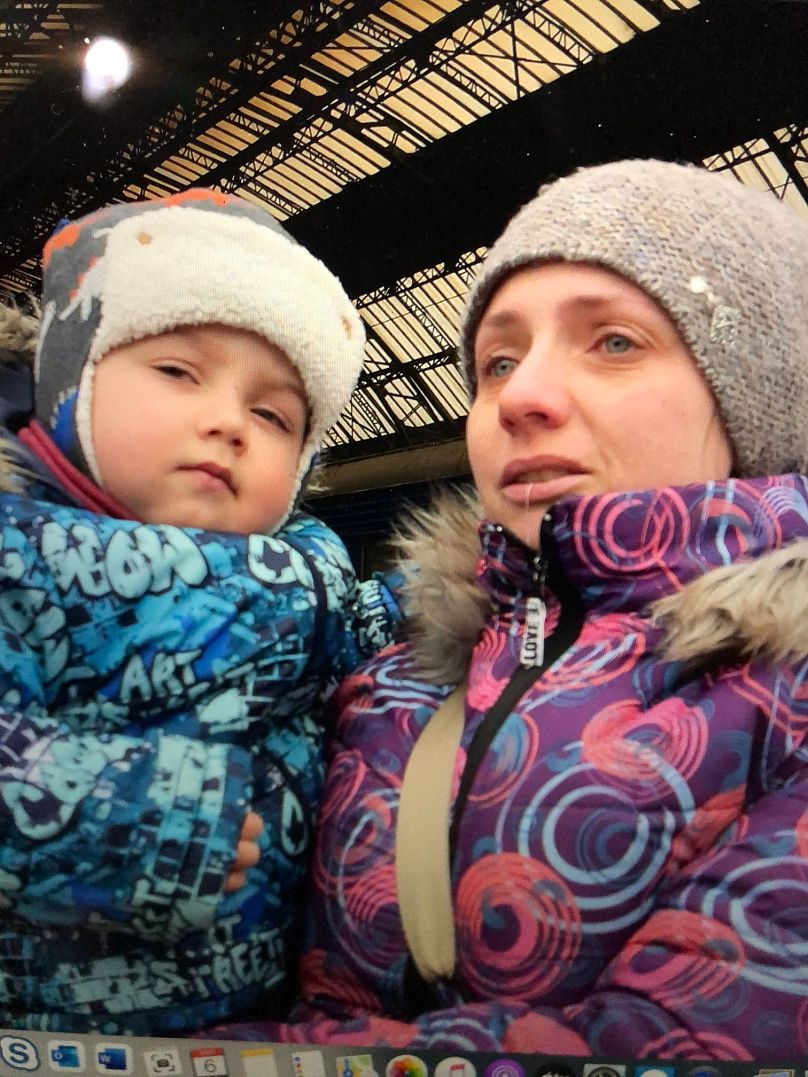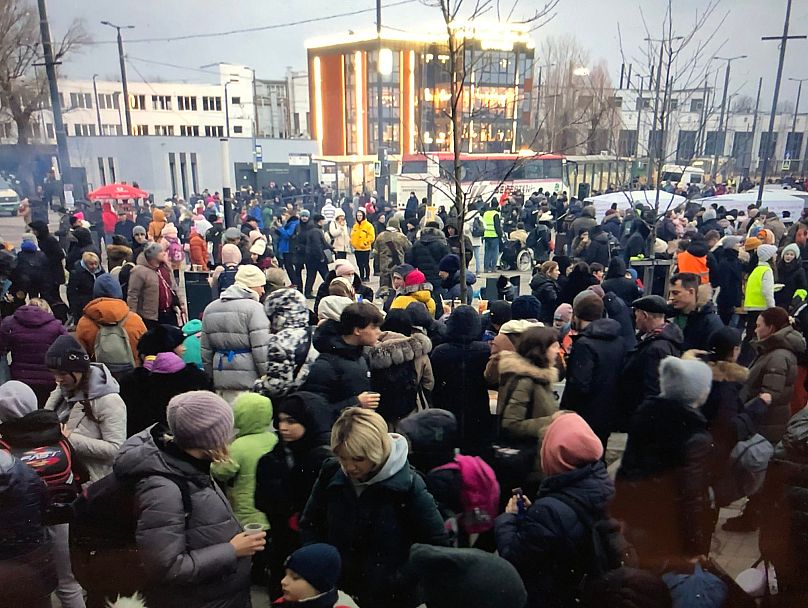This edition of Witness is dedicated to the first two weeks of Russia's invasion of Ukraine. Euronews reporter Valérie Gauriat travelled to Kyiv and Lviv in the west of the country, gathering testimonies. This is her first-person account of the early stages of the war.
As I stood on Maidan square in Kyiv on the 24th February 2022, the gravity of what had just befallen Ukraine crept under my skin. In the deserted epicenter of the capital, the air was thick with fumes and sorrow.
Kyiv, Mariupol, Donetsk, Kharkiv, Odesa: the country’s main cities are awoken to the sound of explosions following Russian President Vladimir Putin's decision to launch the invasion.
Wrapping blue and yellow flags around their shoulders, a handful of people gather at the square in a show of defiance. “If we need to, we will take up arms, to defend our country, our democracy. We want to show the world that we are not scared”, says 25-year-old Artem, gravely.
It's a spirit I will encounter regularly throughout my two weeks in the war-torn country. A spirit that will be shrouded in tears and pain with the everyday news of death and destruction. The chilling shriek of air raid sirens tears the silence of the city centre.
When I meet Anabell, a young dancer, she is about to go down into the Kyiv metro where she has sought refuge with her parents.
“Every time we go outside, we’re very nervous, will there be a bomb or a rocket? We try not to panic. Me and my parents will stay here until the last possible moment. We will get through this,” she tells me.
Back at the historic Ukrayina hotel, a strange scene awaits me. Groups of journalists, with all their luggage, are getting ready to go. Everyone has been ordered to leave before dawn. News of an imminent strike on Kyiv has spread. All the hotel staff has disappeared.
I send my last files to the newsroom just before the 10 pm curfew and drag my bags, with the help of a Turkish colleague, to another hotel on the opposite side of Maidan square. Night falls on an eerily deserted city.
A few hours later, that unnerving calm is shattered as Kyiv is woken to more sirens and explosions. The sun has also broken through the cloud, a strange reminder that spring is so close at this darkest of hours.
The tension is palpable. Intermittent gunshots echo near the city centre. I'm drawn to a group of police vehicles near Maidan. Operating under emergency powers, they surround and search civilian cars and their occupants for weapons. Unregistered automatic rifles lying on the floor, have been found. On the lookout for so-called “saboteurs” infiltrated by pro-Russian groups in the city, one officer tells me that it is their third such find that day. I'm told to move away.
I decide to venture into the bowels of the Kyiv metro. The sight takes my breath away, like a live re-enactment from World War II archives.
Dozens of people, families, clad with luggage and plastic bags, full of whatever they could take with them, are huddled in small groups, sitting on blankets and training mats, along the walls of the metro corridors. Many have taken their pets with them.
Distress and anger veils their weary faces. “What kind of mind has the man who created such a situation? I just don’t understand,” exclaims 16-year-old Daryna, as her 10-year-old brother looks on. “It’s our home, our city, our country, and we have to leave to save our lives. It’s devastating”, sighs her mother Kateryna.
As I make my way out of the subway, I’m stopped by nervous security personnel. They calm down once my documents check out, and escort me through the metro’s locked doors.
A total curfew has been announced in the city for the next two days. I spend time with Denis and Dima, 18 and 19, who work relentlessly at the reception of my hotel. They tell me that most of the staff have left; they have to deal with everything. Taking care of incoming and outgoing guests - now exclusively journalists - and their constant requests.
Food is running out, as supply lines are cut. In between check-ins and check-outs, and the never-ending calls, the boys scurry to find biscuits from shutdown bakeries.
Their faces are pale white with fatigue - dark circles under their eyes. They take turns to sleep no more than two to three hours a night, on the sofas in the hotel lobby.
“Someone has to keep things running,” Denis says. “I work so much that I sometimes forget about the war,” smiles Dima, before rushing off to deal with another errand.
Still, the war has taught him one thing: “I used to do nothing, just watch movies and play video games. Now I have goals,” he says. Both young men agree on one thing: “We don’t want to have to kill anyone. But if we have to, we will go and help our troops.”
"We will win. We have to win"
From Kyiv to the eastern city of Lviv, I was struck by the courage and determination of all those I met. Whether among the hundreds of volunteers relentlessly providing humanitarian help to those in need, those mobilised in the territorial defense force to support the Ukrainian army, or among the scores of refugees on their way to safety in neighbouring countries, all were adamant: Ukraine would rise from the ashes.
As in the words of Gala, about to board a bus to Poland, her voice trembling: “We are leaving with nothing. We will return to build a better, stronger country. We will win. We have to win:”
But all those I have met insisted: this cannot happen without stronger action from the Western world. The words of Andriy, whom I met in a demonstration in the Polish city of Krakow, just before heading for the airport, still echo in my mind: “NATO must close the sky! I ask all people of the world: don’t keep silent! I say to Biden Macron, Johnson, Scholz, and all the others: if you don’t stop Putin, the blood of the Ukrainian people will be on your hands.”
